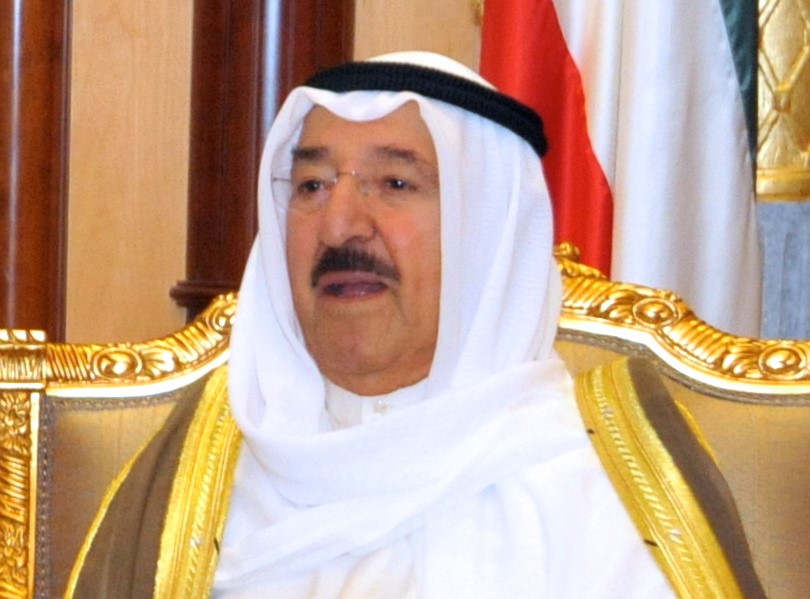Death of Kuwait ruler Sheikh Sabah draws outpouring of grief Dubai
“With the departure of Sheikh Sabah, we lose a wise leader who devoted his life to the service of his country and to Arab and Islamic nations,” Saudi Foreign Minister Prince Faisal bin Farhan wrote on Twitter. Such was Sheikh Sabah's regional status that condolences even poured in from those locked in long-running rivalries with Kuwait's key Gulf allies.

- Country:
- United Arab Emirates
The death of Sheikh Sabah Al Ahmad Al Sabah, the leader of Kuwait who earned a reputation as a seasoned diplomat and a rare ruler who could cross the region's political and sectarian divides, touched off an outpouring of grief from the Arab world Tuesday. As news of his death broke, condolence messages streamed in from across the region and from Western countries with longstanding ties to Kuwait, including the U.S. and Britain.
As a member of the Gulf Cooperation Council, a regional body of Arab Gulf states, Kuwait has often charted its own course, pushing for diplomacy to resolve a bitter dispute between Qatar and other Arab states that continues to this day. Diplomats around the world lauded how Sheikh Sabah navigated regional feuds and offered humanitarian aid in times of crisis. Sheikh Sabah “was an extraordinary symbol of wisdom and generosity, a messenger of peace, a bridge-builder,” said U.N. Secretary-General Antonio Guterres.
The United Arab Emirates announced a three-day mourning period. The UAE's day-to-day ruler, Abu Dhabi Crown Prince Sheikh Mohammed bin Zayed Al Nahyan, described the late emir as “a great pioneer in Gulf cooperation.” In Saudi Arabia, one of Kuwait's closest allies, the royal court said the emir died after a journey full of achievement and generous service to his country and humanity. “With the departure of Sheikh Sabah, we lose a wise leader who devoted his life to the service of his country and to Arab and Islamic nations,” Saudi Foreign Minister Prince Faisal bin Farhan wrote on Twitter.
Such was Sheikh Sabah's regional status that condolences even poured in from those locked in long-running rivalries with Kuwait's key Gulf allies. The emir of Qatar, Sheikh Tamim bin Hamad Al Thani, referred to Sheikh Sabah as the “father of all." “With his departure, the world has lost a beacon and symbol of humanity,” he wrote.
Yemen's Shiite Houthi rebels, who are battling a Saudi-led military coalition for control of the country, also offered tribute. Mohammed Abdul-Salam, a Houthi spokesman, said the rebels appreciated his support of efforts to end the country's brutal five-year conflict. In Lebanon, where the late Kuwaiti leader played a key role in trying to end the country's ruinous 1975-90 civil war and later helped with its reconstruction, politicians offered their condolences.
“With the death of Sheikh Sabah, Lebanon has lost a great brother who stood by the Lebanese during the difficult circumstances over the past years,” said a statement from Lebanese President Michel Aoun. The U.S. Ambassador to Kuwait Alina Romanowski called Sheikh Sabah a “popular leader and special friend of the U.S.” The U.S. Embassy in Kuwait said he “devoted his life to peace and regional stability.” From Britain, Prime Minister Boris Johnson said Sheikh Sabah “made a personal contribution to regional stability and humanitarian assistance which will long be remembered.” “I sincerely hope the long and deep ties that unite our countries will continue,” he added.
A statement issued from Egyptian President Abdel Fattah el-Sissi expressed “great sadness” over Sheikh Sabah's death, recalling the long-standing “fraternal stance” of the emir toward Egypt. Pakistan's Prime Minister Imran Khan said he was “deeply grieved” by his death, while Jordan's royal court announced a nationwide 40-day mourning period. King Abdullah II mourned the loss “of a great brother and wise leader who loved Jordan.” In Iraq, Kuwait's northern neighbor, Prime Minister Mustafa al-Kadhimi praised Sheikh Sabah's efforts toward “regional peace and stability.” He recalled him as one of the first leaders to support Iraqi state-building efforts after the 2003 U.S. led invasion that toppled the regime of Saddam Hussein, and later in fighting the Islamic State group.
Veteran U.N. diplomat Lakhdar Brahimi described Sheikh Sabah's support for “dialogue in times of crisis,” citing the friendly present-day relations between Kuwait and Iraq as proof of the late emir's “wisdom and farsightedness” three decades after the Gulf War. As Kuwait's Cabinet announced that Crown Prince Sheikh Nawaf Al Ahmad Al Sabah would take the reins of power, many expressed hope that the tiny oil-rich country would follow on the path set by Sheikh Sabah.
“The role that Kuwait traditionally plays in the Middle East as a bridge-builder is needed today more than ever,” said Ban Ki-moon, former U.N. secretary-general and deputy chair of The Elders, a group of world leaders.
(This story has not been edited by Devdiscourse staff and is auto-generated from a syndicated feed.)
- READ MORE ON:
- Sabah Al Ahmad Al Sabah
- Kuwait
- Mohammed bin Zayed Al Nahyan
- Faisal bin Farhan
- Lebanon
- Gulf Cooperation Council
- Tamim bin Hamad Al Thani
- Mustafa alKadhimi
- Nawaf Al Ahmad Al Sabah
- Antonio Guterres
- UN
- Britain
- Boris Johnson
- Lakhdar Brahimi
- Imran Khan
- Michel Aoun
- Saudi Arabia
- Qatar
- Ban Kimoon
- Gulf
ALSO READ
International Push to Free Israeli-Russian Researcher Kidnapped in Iraq
Oil tanker struck by Yemen's Houthi rebels that threatened massive Red Sea spill 'successfully' salvaged, firm says, reports AP.
Tragic Explosion at Yemeni Gas Station Sparks Fatal Inferno
Tragic Explosion: Deadly Gas Station Blast in Yemen
Iraqi Airstrike Eliminates Top IS Leaders in Hamrin Mountains










